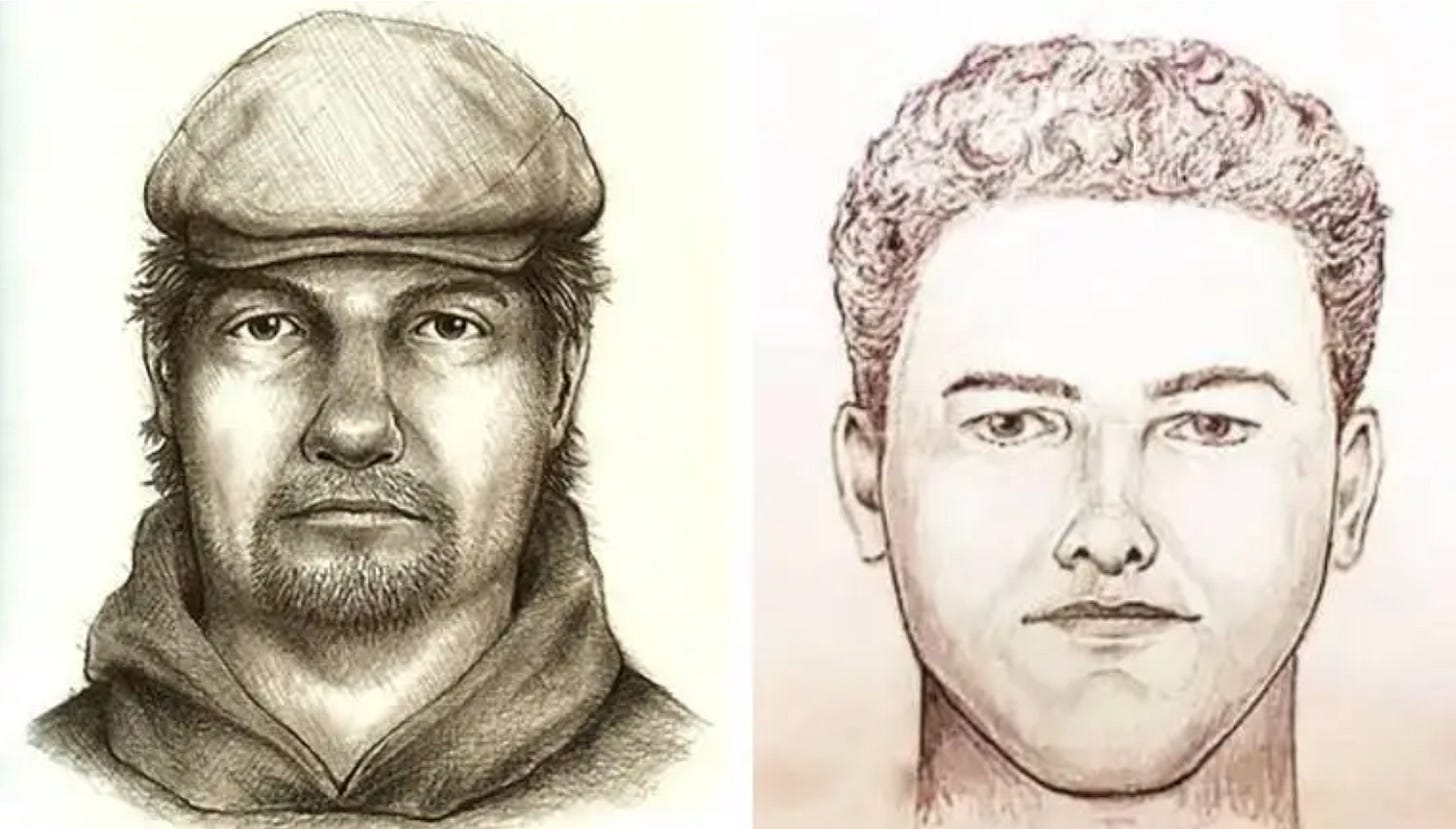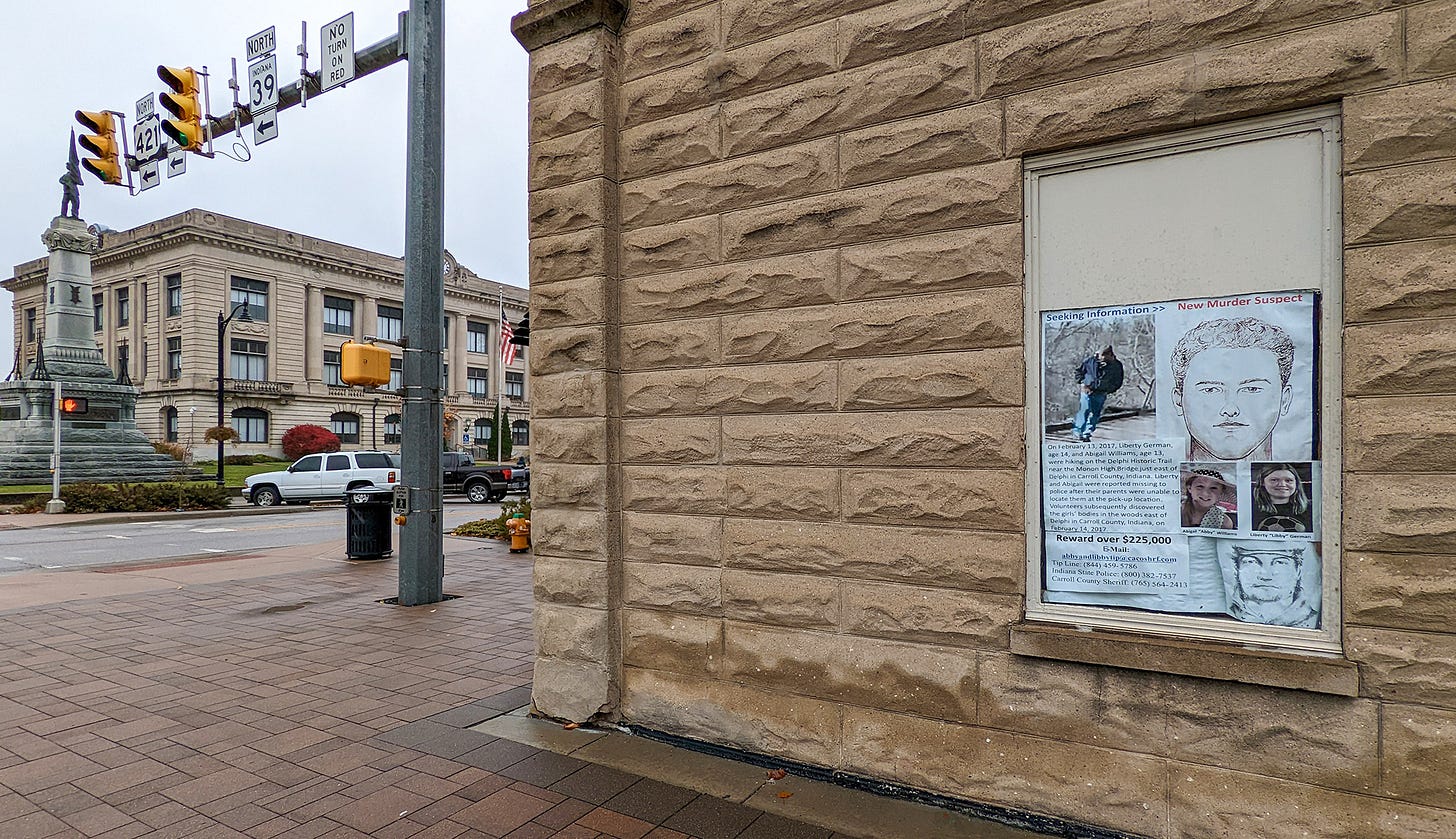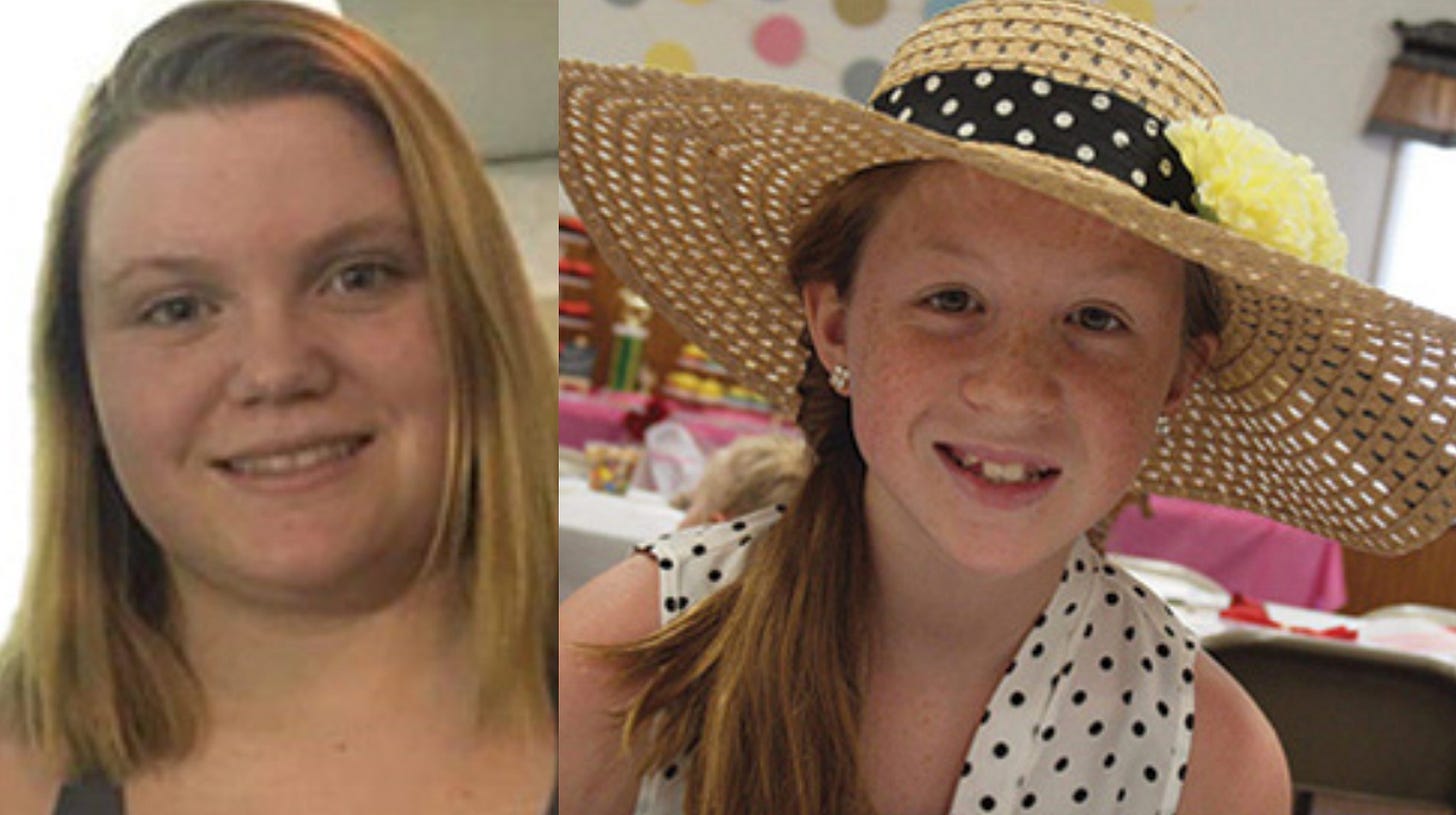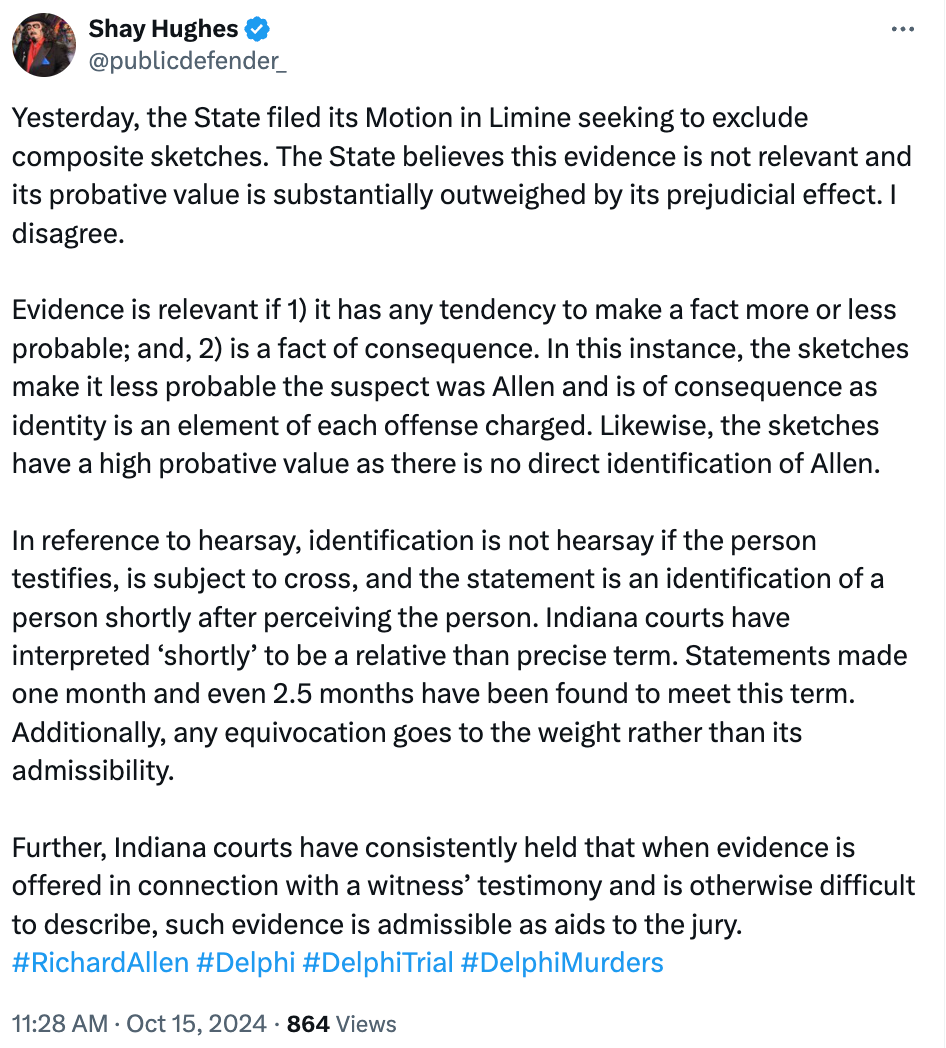Delphi trial update: Jury selected; prosecutor looks to block police sketches
Jury’s set for opening arguments Friday in Richard Allen’s murder trial. Before that, several motions are on the table, possibly Thursday, including a move to block ‘Bridge Guy’ sketches from trial
Today’s edition is sponsored by Food Finders Food Bank, kicking off its 14th annual Drive Away Hunger fall food drive Nov. 1 through Dec. 6. Find out more here about how you or your group can help stock Food Finders shelves and ensure those facing hunger can provide for their families this winter.
DELPHI TRIAL UPDATE: JURY SELECTED; PROSECUTOR LOOKS TO BLOCK ‘BRIDGE GUY’ SKETCHES
Days away from opening statements in the Delphi murders trial, the Carroll County prosecutor is trying to block Richard Allen’s defense team from referring to pair of composite police sketches investigators used for years in hopes of identifying the “Bridge Guy” and generate tips after the 2017 murders of Delphi eighth-graders Abby Williams and Libby German.
In a motion filed Monday, the first day of jury selection in what’s scheduled to be a five-week trial, Carroll County Prosecutor Nick McLeland argued that presenting the sketches to a jury “would result in undue prejudice, confuse or mislead the jury or is impermissible hearsay.”

McLeland also told the court in the motion that the prosecution didn’t plan to bring in witnesses who advised sketch artists “for the purpose of in-court identification of the defendant.”
Produced two years apart – one several months after the murders in 2017, the other during an investigation update in 2019 – the sketches were everywhere in and around Delphi, on windows of businesses, posters around the courthouse square and centerpieced on the Indiana State Police sites set up to collect tips.
Judge Fran Gull, the special judge hearing Allen’s case, said she will hear arguments about the motion before opening arguments in the trial Friday, according to pool reporters in Allen Superior Court for the second day of jury selection and pretrial hearings.
A sketch of a goatee-faced, hat-wearing man was released in 2017, based on composite descriptions from people who were on the Monon High Bridge Trail the day Abby Williams and Libby German were told by a man, “Guys … down the hill.” Libby had captured a video clip of a man walking across the Monon High Bridge, an abandoned trestle 60 feet above Deer Creek, on her cellphone. The sketch was another clue among a small number shared by investigators during the first year of the search for anyone tied to the murders.
In April 2019, Indiana State Police Superintendent Doug Carter presented the second sketch, what appears to be a younger, clean-shaven version of the suspect. That day, Carter told a packed Wabash and Erie Canal Interpretive Center crowd that the investigation was turning eyes close to home.

“We also believe this person is from Delphi — currently or has previously lived here, visits Delphi on a regular basis or works here," Carter said. That was 3½ years before the arrest of Richard Allen, a Delphi homeowner who worked at the local CVS.
"Directly to the killer, who may be in this room: We believe you are hiding in plain sight,” Carter said, staring out into the conference room. “We likely have interviewed you or someone close to you. We know that this is about power to you, and you want to know what we know. And one day you will. A question to you: What will those closest to you think of when they find out that you brutally murdered two little girls?”
Now, McLeland says the sketches don’t fit in with the prosecution’s case and, according to the motion in limine, should be blocked from Allen’s defense, too.
McLeland argued that:
“No composite sketch was instrumental in identifying Richard Allen as a suspect.”
“The defense intends to use composite sketches from the investigation as demonstrative evidence and for impeachment purposes.”
“The composite sketches prepared were intended as an investigative tool to generate leads to identify a suspect and in fact these sketches were not related to the identification of Richard Allen as a suspect.”
“The witnesses who assisted in the preparation of composite sketches of the Bridge Guy would testify that they did not see the person depicted in their sketch for a sufficient length of time to allow them to positively identify the defendant.”
The sketches could mislead the jury. “A composite sketch reflects the police artist's interpretation of someone else's description, based on the artist's synthesis of an infinite variety of facial features and configurations. Creating a composite sketch carries the potential suggestiveness of having a police artist interpret and possibly influence the perceptions of the witness.”
And that “the composite sketches would be hearsay or double hearsay … in that the sketch is an out of court statement and a subjective rendering by one person using the subjective description by another person/witness.”
Shay Hughes, a criminal defense attorney in Tippecanoe County who has been watching and offering legal breakdowns in the Delphi murder case, said he disagreed with the state’s belief that the composite sketches aren’t relevant.
Hughes posted this Tuesday on social media: “Evidence is relevant if 1) it has any tendency to make a fact more or less probable; and, 2) is a fact of consequence. In this instance, the sketches make it less probable the suspect was Allen and is of consequence as identity is an element of each offense charged. Likewise, the sketches have a high probative value as there is no direct identification of Allen.”
The defense hadn’t responded, as of Tuesday afternoon, and Gull hadn’t ruled on the motion.
The court is taking Wednesday off in the case, according to the reports from the media pool in the courtroom Tuesday. The judge plans to give the jury its oath Thursday morning, with time to consider some outstanding motions that day. It wasn’t clear Tuesday whether the question about the sketches would be among those.
A jury selected: The court wrapped up jury selection around 3:30 p.m. Tuesday, the second of three days initially set aside by the judge to find 12 jurors and four alternates. The media pool reported that the judge seated 12 jurors, along with five alternates – one more than previously planned – from a collection of 52 potential jurors Monday and another 50 Tuesday. (It wasn’t clear whether one of those alternatives might be excused or will be asked to participate in the trial.)
Monday’s selection process produced 14 jurors. On Tuesday, three of those were excused – two for health reasons, another for a child care situation. (On Monday, as jurors were being interviewed, one potential juror mentioned that she’d be hard-pressed to find care for her child who was going on 3. When asked by the court if it might be possible to work that out, especially given the $80 to $90 a day, plus free room and board, given to a sequestered jury, she laughed: “Have you tried to get child care lately?”)
After being sworn in Thursday, the jurors – 11 women and six men, all selected from Allen County, 90 miles from Delphi – will be taken to Carroll County for the duration of the trial. They will have limited access to the outside world, beyond the proceedings in Carroll Circuit Court.
Allen’s defense team early on in the case had requested a change of venue to move the trial at least 150 miles from Delphi. Gull rejected that, saying it would cause logistical problems and that the trial belonged in Carroll County. But she agreed it would be difficult in Carroll County, with 20,000 people, to find a jury of 12 that wasn’t intimately invested in the case.
During jury selection, Gull asked how many people in the jury pool had read or seen anything about the murders of Abby Williams and Libby German. About two-thirds of the hands went up in Monday’s jury pool. Of those, a handful told Gull that they knew enough about the case that they’d made up their minds about the outcome. In one case, a man told the court that coworkers “talked about the case all the time.” He was excused.
About the strands of hair found in Abby’s hand: On Monday, Allen’s attorneys peppered potential jurors with this question: Can you wait? The upshot: With the prosecution going first in a case scheduled to last until Nov. 15, the narrative will stack up against Allen possibly for weeks before the defense team gets its turn. On Tuesday, during a “mini-opener” on a second day of jury selection, attorney Andrew Baldwin told potential jurors that their side was prepared to show that DNA from a hair found in Abby Williams’ hand revealed it wasn’t from Allen, according to pool notes from reporters in the courtroom that morning.
That bit was more than Baldwin had told the jury pool Monday, when he leaned into plans to show alleged confessions Allen were false, based on conditions he faced after being sent to Westville Correctional Facility on a safekeeping order issued by a former Carroll County judge.
Details on the DNA evidence from the hand and how the hair was found – and why it wasn’t part of the prosecutor’s probable cause affidavit from November 2022 – wasn’t discussed beyond Baldwin’s mini-opener for the jury pool, according to reporters providing pool coverage from Allen Superior Court.
Real opening statements are scheduled for Friday in Carroll Circuit Court.
Coverage from Monday’s first day of jury selection:
Thanks, again, for sponsorship help today from Food Finders Food Bank, kicking off its 14th annual Drive Away Hunger fall food drive Nov. 1 through Dec. 6. Find out more here about how you or your group can help stock Food Finders shelves and ensure those facing hunger can provide for their families this winter.
Thank you for supporting Based in Lafayette, an independent, local reporting project. Free and full-ride subscription options are ready for you here.
Tips, story ideas? I’m at davebangert1@gmail.com.






